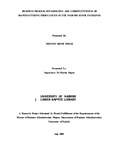| dc.description.abstract | The purpose of this study was to establish the strategic benefits and risks that accrue from business process outsourcing in the manufacturing industry in Kenya. This research problem was studied through the use of a descriptive survey design. The target population of this study was all the 18 manufacturing companies listed under the industrial and allied section of the Nairobi Stock Exchange as at 31st
Findings from this research can have some implications for policy and also for the practice of business process outsourcing in Kenya. Business process outsourcing vendors will be required by their clients to eventually look like application service providers, offering open interfaces and process transparency. From the findings on the strategic benefits, clients will require BPO vendors to actually deliver innovation and optimize outsourced processes, not just running existing processes at a lower cost. The industry will also require some policy and regulations to streamline it, since it is in its infancy. However, BPO vendors will have to use business rules to expose the key decision-points within their processes whether or not they provide transparency in a more general case. The industry can also adopt the use of business rules management systems which would allow the outsourcer to expose these decisions to each of their clients while still running a standard, and black-box, process. BPO Best Practices should include choosing a vendor April 2009. The research employed a census method due to the small size of the population. All the 18 manufacturing companies listed under the industrial and allied section were included as study subjects. Primary data was collected using semi-structured questionnaires to CEOs of the selected companies. Data from the questionnaires were entered into the Software Package for Social Sciences and analyzed based on descriptive statistics. The findings were presented using tables, pie charts and bar graphs for easier interpretation. Findings from the study indicate that major strategic benefits arising from outsourcing non-core business processes in the manufacturing sector are the ability to focus on core business processes and flexibility. Findings from the study indicate that strategic risks arising from business process outsourcing include poor knowledge retention by suppliers, hidden costs and information security and privacy issues.
that's leveraging technology effectively and asking for visibility into the vendor's processes and platforms. | en |

